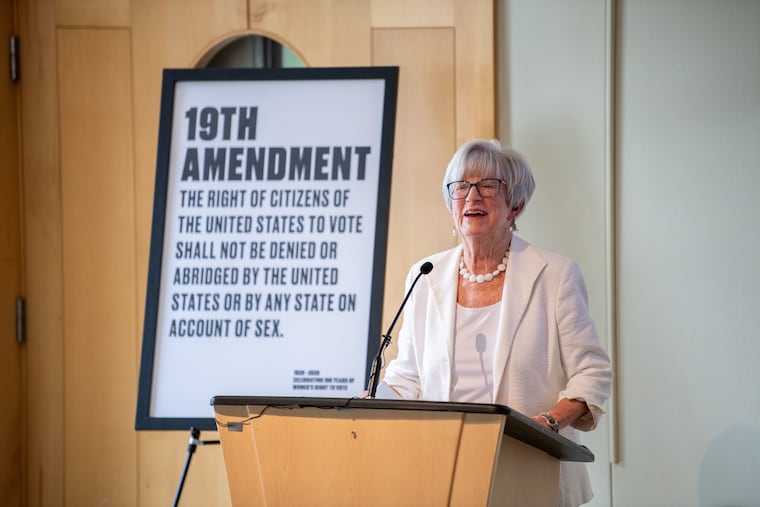Lynn Yeakel, unrelenting voice for women’s equality who waged close race for U.S. Senate, dies at 80
Yeakel won the Democratic primary — and came close to defeating long-serving U.S. Sen. Arlen Specter — during what some were calling the “Year of the Woman."

Lynn Yeakel, 80, a tireless advocate for women’s equality who gained national prominence when she sought to unseat Sen. Arlen Specter over his treatment of Anita Hill during Clarence Thomas’ Supreme Court confirmation hearings, has died.
Ms. Yeakel, who lived in Rosemont, died Thursday, Jan. 13, at a hospital in Fort Myers, Fla., near where she and her husband, Paul, had a second home, said Ms. Yeakel’s daughter, Courtney Yeakel. She declined to share a cause of death but said it came a month after her mother was diagnosed with a disease that progressed rapidly.
Ms. Yeakel, a Democrat, worked with grassroots women’s organizations as a founder of Women’s Way until 1992, when her campaign for U.S. Senate took her within a few percentage points of beating the long-serving Specter, a Republican.
Years later, she established Vision 2020, which aimed to advance women toward social, economic, and political equality by that year, the 100th anniversary of the 19th Amendment granting women the right to vote. The initiative, since rebooted as Vision Forward, is based at Drexel University, where Ms. Yeakel directed its medical college’s Institute for Women’s Health and Leadership.
“Lynn was a dreamer, but she was also an enabler and she gave people courage by encouraging them,” said Rosemarie Greco, former chief executive of CoreStates and Fidelity banks, who cochaired Vision 2020. “She gave people an understanding of what could be accomplished by constantly reinforcing a vision of equality.”
Ms. Yeakel was born in Portsmouth, Va., in 1941, to Porter Hardy Jr., a businessman who later served as a Democrat in the U.S. House of Representatives, and Lynn Moore, a schoolteacher. She graduated from Randolph-Macon Woman’s College in Lynchburg, Va., and received a master’s degree in management from the American College of Financial Services in King of Prussia.
Ms. Yeakel served as chief executive of Women’s Way, the first and largest women’s fund-raising coalition in the nation, from 1980 until her 1992 Senate run. It was anger over Specter’s inquisition of Hill, a law professor who had accused Thomas of sexual harassment when they worked together at the Equal Employment Opportunity Commission, that prompted Ms. Yeakel to run for the incumbent senator’s seat. She won the Democratic primary — and came close to defeating Specter — during what some were calling the “Year of the Woman,” in which a wave of female candidates including Sens. Dianne Feinstein (D., Calif.) and Carol Moseley Braun (D., Ill.) entered the chamber.
“They just didn’t get it,” Ms. Yeakel said in a later interview with The Inquirer of Specter and the other members of the all-male Senate Judiciary Committee that had grilled Hill. “They did not understand what she was talking about, and they didn’t believe her.”
In 1994, Ms. Yeakel ran for Pennsylvania governor, finishing fourth among seven candidates in a Democratic primary that was won by Mark Singel, who was defeated in the general election by Tom Ridge. Six years later, she came up fewer than 800 votes short of taking Republican Richard Tilghman’s seat in the state’s 17th Senate District, which includes parts of Delaware and Montgomery Counties.
Ms. Yeakel founded Vision 2020 in 2009, quickly building it into a national organization with delegates from around the country who met at a yearly congress to work toward women’s empowerment. Its objectives included seeking 50-50 shared leadership among women and men in business and government, and increasing women’s civic engagement through voting and public service.
“We need to learn to think and act like the majority that we are,” Ms. Yeakel told The Inquirer at the initiative’s launch. “That’s really one of the goals of this dialogue, addressing not only barriers that are external, but internal barriers as well.”
While some of the events planned for its namesake year were scuttled by the coronavirus pandemic, an interactive exhibit on women’s suffrage and its ties to current social movements, called “A Seat at the Table,” has been in place at the Kimmel Center in Center City since February 2020.
In addition to basing Vision 2020 there, Ms. Yeakel’s activities at Drexel included the development of the Woman One Award and Scholarship Fund and the D. Walter Cohen Shared Leadership Scholarship for medical students from underrepresented communities.
“While her loss will be keenly felt throughout the Drexel and Greater Philadelphia communities, and by community partners across the nation, her life and work will continue to inspire future generations working for justice and equality,” Drexel president John Fry said in a statement issued Saturday.
Over nearly two decades, the Drexel programs have raised almost $3 million in tuition support for 36 students, partly through galas honoring a different woman leader each year. In 2022, Ms. Yeakel was slated to herself be awarded the honor to celebrate her planned retirement.
“To this day, when people find out my last name and who my mother is, they just stop me and say, ‘Your mom is an inspiration,’” said Courtney Yeakel. “She just stood for so much for so many women.”
In addition to her husband and daughter, Ms. Yeakel is survived by son Paul Jr. and six grandchildren. Plans for a memorial service are being finalized.